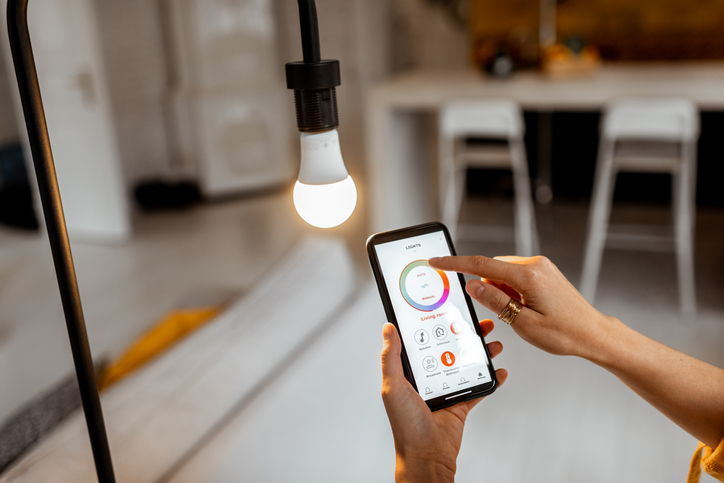In an increasingly interconnected world, our smart devices are slowly becoming a bigger part of our everyday lives, at home and at work. Just how popular are smart homes? By 2025, “the number of smart homes in the world is expected to be 478.2 million.
Devices connected to the Internet of Things (IoT) are double-edged swords, however. Along with the joy of technological evolution comes the lingering fear of security concerns — especially when it comes to digital or cloud-based technology. Here, we’ll take a look at some of the main pros and cons of smart home devices.
Smart Device Security Benefits & Drawbacks
With the adoption of any new technology comes doubts about its effectiveness and, oftentimes, its security and reliability. However, smart devices can add great value to your daily life, helping you automate tasks and increase your productivity, making the risks worth it for some users.
IoT home technology has also come a long way in the past several years. As it stands now, here are some of the main benefits and drawbacks:
Benefits
- Security: Contrary to popular belief, hooking your home up to certain smart devices can better safeguard your property against intruders. The main ways of doing so are through window and door sensors, smart cameras and locks, and video doorbells. These security features allow you to visually inspect your home from your smartphone, no matter how far away you may be. Increased peace of mind is one of the perks of a smart home, and securing your home when you travel has never been easier.
- Convenience: One of the main reasons people choose to make the switch to IoT is the increased convenience it affords. The flexibility to control your air conditioner from afar, for instance, allows you to monitor conditions in your home from anywhere in the world. No longer do you have to search your music library for your favorite song — Alexa will take care of that task for you!
- Streamlined business operations: IoT’s usefulness extends far beyond the home, but these days, the lines between home and business are often blurred. If you’re working from home, having a smart home system could be essential to refining your business processes. Smart devices are especially useful in fields like medicine and agriculture, where they can reduce unnecessary spending and increase customer satisfaction.
Drawbacks
- Internet reliability: Because smart devices rely on the Internet and electricity, you may find yourself at a loss during a power outage or extreme weather event. Of course, backup supply options are available, but they come at a cost many are not willing to pay at this point in time.
- Privacy concerns: As we move toward increased adoption of IoT devices, privacy and cybersecurity concerns weigh heavy on the minds of homeowners, renters, and business owners. Hacking and security risks are always present, and virtual crime is more difficult to address than physical crimes. For widespread adoption to take place, all software, smart devices, and networks must be secured against attack. Even Bluetooth comes with its security vulnerabilities and is susceptible to viruses, eavesdropping, and more.
- Cost: Price is one concern when it comes to purchasing smart devices for your home, depending on what devices you’re looking for and whether or not professional installation is required. Fortunately, in the long run, IoT devices tend to be fairly cost-effective, but when you’re getting started, you may prefer to explore affordable smart home products, from smart blinds to motion sensors; the former can reduce heat gain by as much as 45%, while the latter can save you up to 30% on your monthly utility bill!
Building a Smart World
In the digital age, everything is increasingly connected, whether inside or outside your home. As more and more devices have come online, especially in the wake of the COVID-19 pandemic, experts have sought ways to mitigate security concerns while building the cities of the future. Anticipating a surge in IoT devices, the European Telecommunications Standards Institute (ETSI) has established a new security baseline, launching cybersecurity standards to protect users of smart devices.
Looking toward the future, IoT promises to extend far beyond private homes and businesses, scaling up to encompass entire cities. While the benefits and drawbacks of smart cities are addressed in a different article, suffice it to say that greater strides need to be made in fields like banking, information technology, and security infrastructure before safe, widespread IoT adoption can occur. So far, however, promising results include safer flooding monitoring in Buenos Aires, Argentina, and transport optimization in India.
Despite security concerns, the future looks bright for IoT. In the words of businessman Chuck Robbins, “The opportunity we have is to build a secure, intelligent platform that solves some of the world’s greatest problems at scale. That’s what’s possible with hundreds of billions of connections and the capabilities that we can deliver together.”
Note: This blog article was written by a guest contributor for the purpose of offering a wider variety of content for our readers. The opinions expressed in this guest author article are solely those of the contributor and do not necessarily reflect those of GlobalSign.








